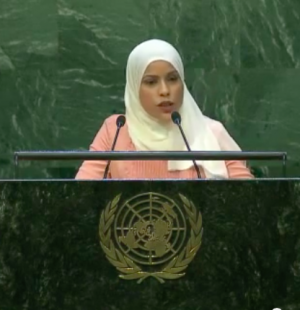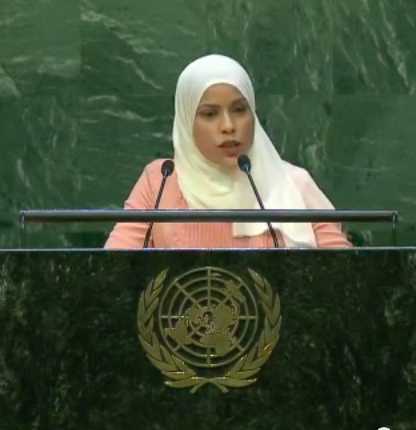By Libya Herald staff.

Tripoli, 11 March 2015:
“As we open this 59th session of the Commission on the Status of Women (CSW), . . .[restrict]we must remember: we can make faster, greater progress if we empower the millions of women peace builders, activists and citizen entrepreneurs around the world making a difference in their communities day by day.”
This was the exhortation spoken by The Voice of Libyan Women (VLW) founder Alaa Murabit as she addressed the audience at the UN Commission on the Status of Women this week. Murabit, one of three youth representatives for the UN Women’s Global Civil Society Advisory Group, was given the honour of giving the opening address for the event, an event that took place in the same week as the 2015 celebration of International Women’s Day (IWD).
This year’s IWD celebration was bittersweet in Libya as many paused to remember key women Libya lost over the past year, including Salwa Bugaighis, Fariha Al-Berkawi, and Intisar Al-Hasairi.
At the same time, many Libyan women carry on the struggle to promote women’s rights and general human rights in spite of risks and obstacles. Haifa El-Zahawi and a crew of teachers provide Benghazi Skype School for Benghazi’s school children whose schools are closed because of the fighting. Zahra Langhi and the members of Libya Women’s Platform for Peace have worked tirelessly to ensure women’s rights are included in the constitution. In January, 35 Libyan women from all over the country gathered to demand that the current armed conflicts taking place cease.
Murabit, a champion for women’s rights in Libya, stressed in her CSW speech that women play a key role in the peace building process and in confronting the extremist positions that threaten to destroy peace in Libya.
“Women peace builders are leading the fight against extremism by challenging its root causes,” said Murabit. “Women peace builders – including those in my own organisation – are making change, right now, around the world. We walk into extremists’ homes, schools and workplaces. Through informal education and dialogue, we hand the community words and tools to fight with. These are weapons to fight against violence, poverty, fear, injustice and corruption: the roots of extremism.”
In an interview with the Libya Herald, Murabit emphasised, “Women are vital to conflict resolution and sustainable peace building. Despite their relative lack of formal political authority, their community credibility and networks make them crucial to sustainable peace, dialogue and cohesion.”
Murabit and The Voice of Libyan Women have been engaging those who would be seen to oppose gender equality in Libya.
“There is no point in having conversations when everyone at the table agrees it is necessary,” Murabit told the Libya Herald, adding, “It is easy to discuss gender equality with those who are like minded. It is necessary to discuss gender equality with those who are not. I have learned through my work that gender equality is usually opposed due to a lack of understanding, and it is only through dialogue that misconceptions can be addressed.”
Murabit explained that VLW communicates with local community and cultural leaders, providing them with a greater understanding of what gender equality means in the practical sense.
“Working with existing community structures, we have a greater ability to reach the whole population and enhance the lives of all citizens through sustainable and inclusive processes.”
In a bold statement that exudes hope and confidence, Murabit added, “Our strongest opposition has the ability to become our greatest advocates.”
Alaa Murabit and The Voice of Libyan Women can be reached via the following:
Email: info@vlwlibya.org
Website: vlwlibya.org [/restrict]






